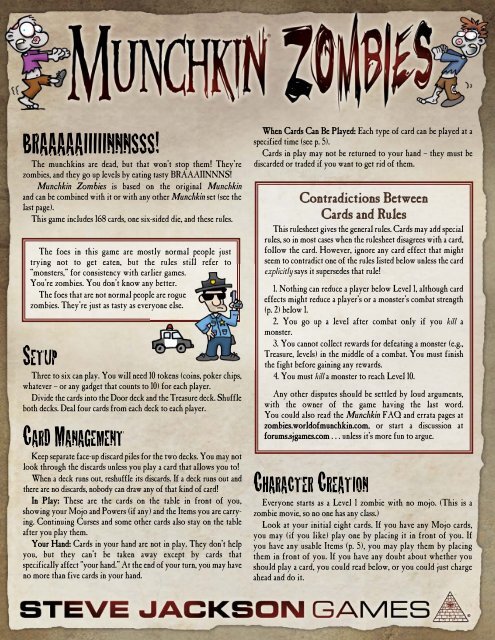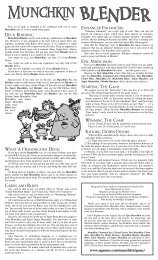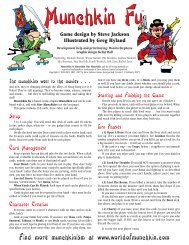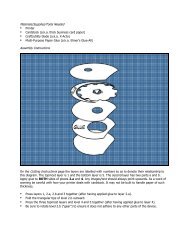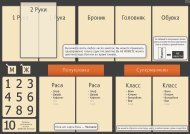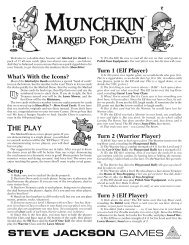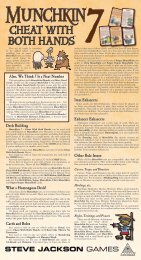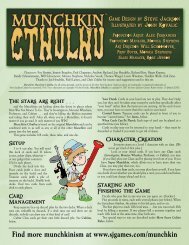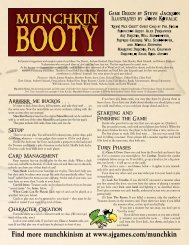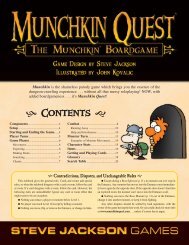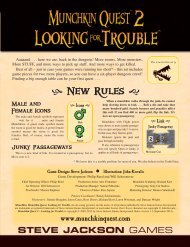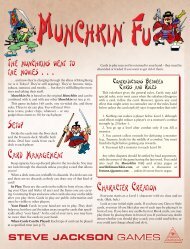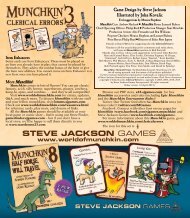Create successful ePaper yourself
Turn your PDF publications into a flip-book with our unique Google optimized e-Paper software.
BRAAAAAIIIIINNNSSS!<br />
The munchkins are dead, but that won’t stop them! They’re<br />
zombies, and they go up levels by eating tasty BRAAAIINNNS!<br />
<strong>Munchkin</strong> Zombies is based on the original <strong>Munchkin</strong><br />
and can be combined with it or with any other <strong>Munchkin</strong> set (see the<br />
last page).<br />
This game includes 168 cards, one six-sided die, and these rules.<br />
The foes in this game are mostly normal people just<br />
trying not to get eaten, but the rules still refer to<br />
“monsters,” for consistency with earlier games.<br />
You’re zombies. You don’t know any better.<br />
The foes that are not normal people are rogue<br />
zombies. They’re just as tasty as everyone else.<br />
SETUP<br />
Three to six can play. You will need 10 tokens (coins, poker chips,<br />
whatever – or any gadget that counts to 10) for each player.<br />
Divide the cards into the Door deck and the Treasure deck. Shuffle<br />
both decks. Deal four cards from each deck to each player.<br />
CARD MANAGEMENT<br />
Keep separate face-up discard piles for the two decks. You may not<br />
look through the discards unless you play a card that allows you to!<br />
When a deck runs out, reshuffle its discards. If a deck runs out and<br />
there are no discards, nobody can draw any of that kind of card!<br />
In Play: These are the cards on the table in front of you,<br />
showing your Mojo and Powers (if any) and the Items you are carrying.<br />
Continuing Curses and some other cards also stay on the table<br />
after you play them.<br />
Your Hand: Cards in your hand are not in play. They don’t help<br />
you, but they can’t be taken away except by cards that<br />
specifically affect “your hand.” At the end of your turn, you may have<br />
no more than five cards in your hand.<br />
When Cards Can Be Played: Each type of card can be played at a<br />
specified time (see p. 5).<br />
Cards in play may not be returned to your hand – they must be<br />
discarded or traded if you want to get rid of them.<br />
Contradictions Between<br />
Cards and <strong>Rules</strong><br />
This rulesheet gives the general rules. Cards may add special<br />
rules, so in most cases when the rulesheet disagrees with a card,<br />
follow the card. However, ignore any card effect that might<br />
seem to contradict one of the rules listed below unless the card<br />
explicitly says it supersedes that rule!<br />
1. Nothing can reduce a player below Level 1, although card<br />
effects might reduce a player’s or a monster’s combat strength<br />
(p. 2) below 1.<br />
2. You go up a level after combat only if you kill a<br />
monster.<br />
3. You cannot collect rewards for defeating a monster (e.g.,<br />
Treasure, levels) in the middle of a combat. You must finish<br />
the fight before gaining any rewards.<br />
4. You must kill a monster to reach Level 10.<br />
Any other disputes should be settled by loud arguments,<br />
with the owner of the game having the last word.<br />
You could also read the <strong>Munchkin</strong> FAQ and errata pages at<br />
zombies.worldofmunchkin.com, or start a discussion at<br />
forums.sjgames.com . . . unless it’s more fun to argue.<br />
CHARACTER CREATION<br />
Everyone starts as a Level 1 zombie with no mojo. (This is a<br />
zombie movie, so no one has any class.)<br />
Look at your initial eight cards. If you have any Mojo cards,<br />
you may (if you like) play one by placing it in front of you. If<br />
you have any usable Items (p. 5), you may play them by placing<br />
them in front of you. If you have any doubt about whether you<br />
should play a card, you could read below, or you could just charge<br />
ahead and do it.
STARTING AND FINISHING THE GAME<br />
Decide who goes first in any agreeable manner. Heh, heh.<br />
Play proceeds in turns, each with several phases (see below). When<br />
the first player finishes his turn, the player to his left takes a<br />
turn, and so on.<br />
The first player to reach 10th level wins . . . but you<br />
must reach 10th level by killing a monster, unless a<br />
card specifically allows you to win another way.<br />
TURN PHASES<br />
At the start of your turn, you may play cards,<br />
switch items from “in use” to “carried” or vice<br />
versa, trade items with other players, and sell items<br />
for levels. When your cards are arranged the way you<br />
want, go to phase 1.<br />
(1) Kick Open The Door: Draw one card from the<br />
Door deck and turn it face up.<br />
If it’s a monster, you must fight it. See Combat.<br />
Resolve the combat completely before you go on. If you kill it, go up<br />
a level (or two, for some especially nasty monsters!) and take the<br />
appropriate number of Treasures.<br />
If the card is a Curse – see Curses, p. 5 – it applies to you<br />
immediately (if it can) and is discarded.<br />
If you draw any other card, you may either put it in your hand or<br />
play it immediately.<br />
(2) Look For Trouble: If you did NOT draw a monster when you<br />
first opened the door, you now have the option of playing a monster<br />
(if you have one) from your hand and fighting it, just as if you had<br />
found it when you kicked open the door. Don’t play a monster you<br />
can’t handle, unless you’re sure you can count on getting help!<br />
(3) Loot The Room: If you did not find a monster by kicking open<br />
the door and you did not Look For Trouble, you loot the room . . .<br />
draw a second card from the Door deck, face down, and place it in<br />
your hand.<br />
If you met a monster but ran away, you don’t get to loot the room.<br />
(4) Charity: If you have more than five cards in your hand, you<br />
must play enough of them to get down to five, or give the excess to the<br />
player with the lowest Level. If players are tied for lowest, divide the<br />
cards as evenly as possible, but it’s up to you who gets the bigger set(s)<br />
of leftovers. If YOU are the lowest or tied for lowest, just discard<br />
the excess.<br />
It is now the next player’s turn.<br />
COMBAT<br />
To fight a monster, compare its combat strength to yours. Combat<br />
strength is the total of Level plus all modifiers – positive or negative<br />
– given by items and other cards. If the monster’s combat strength is<br />
equal to yours, or greater, you lose the combat and must Run Away –<br />
see below. If your combat strength totals more than the monster’s,<br />
you kill it and go up a level (two for some big monsters). You’ll also<br />
get the number of Treasures shown on its card.<br />
Sometimes a card will let you get rid of the monster without<br />
killing it. This is still “winning,” but you don’t get a level.<br />
Sometimes, depending on the card, you might not get<br />
the treasure, either.<br />
Some monster cards have special powers that affect<br />
combat – a bonus against one Mojo or Power, for<br />
instance. Be sure to check these.<br />
One-shot cards (the ones that say “Usable once<br />
only”) may be played directly from your hand during<br />
combat. You can also use one-shot Items that you<br />
already had in play. Discard these cards after the combat,<br />
whether you win or lose.<br />
Some Door cards may also be played into a combat, such<br />
as monster enhancers (see p. 5).<br />
While you are in combat, you cannot sell, steal, equip,<br />
unequip, or trade items, or play Items (except for one-shots)<br />
from your hand. Once you expose a monster card, you must<br />
resolve the fight with your equipment as it stands, plus any one-shot<br />
items you choose to play.<br />
Discard the monster card, including any enhancers and<br />
one-shot cards played, and draw treasure (see below). But note: someone<br />
may play a hostile card on you, or use a special power, just as you<br />
think you have won. When you kill a monster, you must wait a<br />
reasonable time, defined as about 2.6 seconds, for anyone else to speak<br />
up. After that, you have really killed the monster, and you really get<br />
the level(s) and treasure, though they can still whine and argue.<br />
Fighting Multiple Monsters<br />
Some cards (notably Wandering Monsters) allow your rivals<br />
to send other monsters to join the fight. You must defeat their<br />
combined combat strengths. Any special abilities, such as fighting<br />
with your Level only, apply to the entire fight. If you have the right<br />
cards, you can eliminate one monster from the combat and fight the<br />
other(s) normally, but you cannot choose to fight one and run from<br />
the other(s). If you eliminate one with a card, but then run from the<br />
other(s), you don’t get any Treasure!<br />
Asking For Help<br />
If you cannot win a combat on your own, you may ask any other<br />
player to help you. If he refuses, you may ask another player, and so<br />
on, until they all turn you down or someone helps. Only one player<br />
can help you, adding his combat strength to yours. Anyone can play<br />
cards to affect your combat, however!<br />
You can bribe someone to help. In fact, you’ll probably have to.<br />
You may offer your helper any Item(s) you are currently carrying, or<br />
any number of the Treasure cards the monster has. If you offer him<br />
part of the monster’s treasure, you must agree whether he picks first,<br />
or you pick first, or whatever.<br />
2
The special abilities or vulnerabilities of the monster also apply to<br />
your helper, and vice versa. For instance, if you are not a Voodoo<br />
Zombie yourself, and a Voodoo Zombie helps you against the Nun,<br />
the monster is -2 against you. But if you are facing the Tax Man and<br />
a Voodoo Zombie helps you, the monster’s combat strength is<br />
increased by 5.<br />
If someone successfully helps you, the monster is slain. Discard it,<br />
draw treasure (see below), and follow any special instructions on the<br />
monster card. You go up a level for each slain monster. Your helper<br />
does not go up. You draw the Treasure cards, even if it was your helper’s<br />
special ability that defeated the monster.<br />
Interfering With Combat<br />
You can interfere with others’ combats in several ways:<br />
Use a one-shot card. You could help another player by<br />
throwing a one-shot at his foe. Of course, you can<br />
“accidentally” hit your friend with the card, and it will count<br />
against him.<br />
Play a card to modify a monster. These cards (usually) make a<br />
monster stronger . . . and give it more treasure. You can play<br />
these either during your own combats or during someone else’s<br />
combat.<br />
Play a Wandering Monster along with a monster from your<br />
hand to join any combat.<br />
Curse them, if you have a Curse card.<br />
Running Away<br />
If nobody will help you . . .<br />
or if somebody tries to help,<br />
and your fellow party members<br />
interfere so the two of you still<br />
cannot defeat it . . . you must<br />
run away.<br />
If you run away, you don’t get<br />
any levels or treasure. You don’t even<br />
get to Loot the Room. And you don’t always escape unharmed . . .<br />
Roll the die. You only escape on a 5 or better. Some Items or<br />
abilities make it easier or harder to run away. And some monsters are<br />
fast or slow, and give you a penalty or bonus to your roll.<br />
If you escape, discard the monster. You get no treasure. There are<br />
usually no bad effects . . . but read the card. Some monsters hurt you<br />
even if you get away from them!<br />
If the monster catches you, it does Bad Stuff to you, as described<br />
on its card. This may vary from losing an item, to losing one or more<br />
levels, to Death.<br />
If two players are cooperating and still can’t defeat the<br />
monster(s), they must both flee. They roll separately. The monster(s)<br />
CAN catch them both.<br />
If you are fleeing from multiple monsters, you roll separately to<br />
escape each one, in any order you choose, and suffer Bad Stuff from<br />
each one that catches you as soon as it catches you.<br />
Discard the monster(s).<br />
3<br />
Death<br />
If you die, you lose all your stuff. You keep your Mojo(s), your<br />
Power(s), and your Level (and any Curses that were affecting you<br />
when you died). If you have Double Mojo, keep that as well. Your<br />
new character will look just like your old one.<br />
Looting The Body: Lay out your hand beside the cards you had in<br />
play. Starting with the one with the highest Level, each other player<br />
chooses one card . . . in case of ties in level, roll a die. If your corpse runs<br />
out of cards, tough. After everyone gets one card, the rest are discarded.<br />
Dead characters cannot receive cards for any reason, not even<br />
Charity, and cannot level up.<br />
When the next player begins his turn, your new character appears<br />
and can help others in combat . . . but you have no cards.<br />
On your next turn, start by drawing four cards from each deck,<br />
face-down, and playing any legal Mojo, Power, or Item cards you want<br />
to, just as when you started the game. Then take your turn normally.<br />
Treasure<br />
When you defeat a monster, either by killing it or using a card to<br />
eliminate it, you get its Treasure. Each monster has a Treasure number<br />
on the bottom of its card. Draw that many treasures. Draw facedown<br />
if you killed the monster alone. Draw face-up, so the whole party<br />
can see what you got, if someone helped you.<br />
Treasure cards can be played as soon as you get them. Item cards can<br />
be placed in front of you. “Go Up a Level” cards can be used instantly.<br />
You may play a “Go Up a Level” card on any player at any time.<br />
CHARACTER STATS<br />
Each character is basically a collection of weapons,<br />
armor, and magic items, with three stats: Level, Mojo,<br />
and Powers. For instance, you might describe your<br />
character as “a 9th-level Fast Stealthy Atomic Zombie<br />
with Glowing Talons and a Shopping Cart.”<br />
Level: This is a measure of how generally buff and studly you are.<br />
When the rules or cards refer to your Level, capitalized, they mean<br />
this number.<br />
You gain a level when you kill a monster, or when a card says that<br />
you do. You can also sell items to buy levels (see Items).<br />
Level Counters: It’s Not Cheating,<br />
It’s Using the <strong>Rules</strong>!<br />
If you have an iPhone, iPod touch, iPad, or Android<br />
phone, you’ll like our Level Counter smartphone app.<br />
Just search for “<strong>Munchkin</strong> level counter” or click the link<br />
at levelcounter.sjgames.com. Even better, it gives you<br />
personal in-game advantages to make your friends jealous . . .<br />
which is what being a munchkin is all about!
Example of Combat,<br />
With Numbers and Everything<br />
Feral Carol is a 4th-Level Atomic Zombie with the Glowing<br />
Talons (which gives her a +3 to her combat strength). She kicks<br />
open the door and finds the Pizza Guy, a Level 6 monster. Carol<br />
is at a 7 and the Pizza Guy is at 6, so Carol is winning.<br />
Carol: Want pizza! With BRAAAIIINNS!<br />
Stiff Biff: Pizza is fattening. I’m only doing this to help you.<br />
Biff plays With A Shotgun, adding 5 to the Pizza Guy’s<br />
combat strength. Now Carol is losing, 11 to 7.<br />
Carol: You baaaaad zombie. Me remember this as long as<br />
me . . . can.<br />
Biff: I sorry. BRAAAAINS! I help you now? (Biff is<br />
playing a Level 5 zombie with no special powers, but he is<br />
armed with An Arm and a Leg, worth +5, so his combat<br />
strength is 10. Combined with Carol’s 7, they would have 17,<br />
easily enough to defeat the Pizza Guy’s 11.)<br />
Carol: Hah. Why you hurt me and then help me? (Carol<br />
reads the Pizza Guy’s card and figures it out.)<br />
Carol again: Hey, whoever helps me eat this guy gets<br />
a level. So I don’t feel like offering treasure. Who wants<br />
to help me for free?<br />
Icky Nicky: Sure. Me strong. Me help you for free!<br />
(Nicky is only Level 3, but she is armed with Another<br />
Zombie – worth +4 – and has the Birdhouse, worth another<br />
+4, on her head. So she has a combat strength of 11.)<br />
Carol: Nicky’s lower Level than anybody, so I’m<br />
taking that deal unless anybody makes a better<br />
offer. No? OK, Nicky, it’s a deal. We’re going for<br />
it unless anybody messes with us more . . .<br />
No one says anything, so the Pizza Guy is defeated, despite<br />
his shotgun. Carol goes up a level and claims the Pizza Guy’s<br />
treasures – two from the Pizza Guy card, and one extra because of<br />
With A Shotgun. They’re all face up, because she had a helper, so<br />
everybody sees what she gets. Nicky gets no treasures, but she<br />
goes up a level, because that’s the special rule on the Pizza Guy<br />
card. And the game goes on . . .<br />
You lose a level when a card says that you do. Your Level can never<br />
go below 1. However, your combat strength can be negative, if you get<br />
hit with a Curse or have some other kind of penalty.<br />
Mojo: Your “Mojo” is the source of your special zombie<br />
abilities. Characters may be Atomic, Plague, or Voodoo Zombies. If<br />
you have no Mojo card in front of you, you are just a boring ordinary<br />
zombie.<br />
Each Mojo has different abilities, shown on the cards. You gain<br />
the abilities of a Mojo the moment you play its card in front of you,<br />
and lose them as soon as you discard that card. Some Mojo abilities<br />
are powered by discards. You may discard any card, in play or in your<br />
hand, to power a special ability. See the Mojo cards for when abilities<br />
can be used.<br />
You can discard a Mojo card at any time, even in combat: “I don’t<br />
wanna be a Plague Zombie anymore.” When you discard a Mojo card,<br />
you become just a plain zombie until you play another Mojo card.<br />
You may not belong to more than one Mojo at once unless you<br />
play the Double Mojo card. You may not have two copies of the same<br />
Mojo card in play.<br />
Powers: There are six of these horrible undead abilities (and 15<br />
cards, because each one appears multiple times). You gain the advantages<br />
the moment you play its card in front of you, and lose them as<br />
soon as you lose or discard that card.<br />
Each Power in <strong>Munchkin</strong> Zombies has a Rank of 2, 3, or 4. You<br />
may have any number of Powers as long as their total Rank does not<br />
exceed your Level. There are no Rank 1 Powers in this game, so<br />
starting zombies can have no Powers.<br />
Powers are treated like Mojos. You can’t trade them to<br />
other players, but you may play a Power from your hand<br />
at any time you can legally use it. You may not play<br />
Powers that you cannot legally use. But you may<br />
discard Powers at any time and replace them with<br />
Powers from your hand.<br />
If your Level goes down to less than the<br />
total Rank of your Powers, you must discard<br />
some Powers so that their total Rank is once<br />
again less than or equal to your Level.<br />
Duplicate Power cards give no extra effect.<br />
When you die, you keep all the Powers you have in play,<br />
just as you keep your Mojo.<br />
Some Powers may require discards to use. You may<br />
discard any card, in play or in your hand, to power a<br />
Power.<br />
ITEMS<br />
Each Item card has a name, a size, and a value in Gold Pieces. Each<br />
Item is also good for something. It may give you a combat bonus, or<br />
a special ability, or both.<br />
An Item card in your hand does not count until you play it; at that<br />
point, it is “carried.” You may carry any number of small Items, but<br />
only one Big one. (Any item not designated Big is considered small.)<br />
If something lets you have more than one Big item (for instance, the<br />
Strong Power) and you lose that ability, you must either correct the<br />
problem immediately or get rid of all but one Big item. If it’s your<br />
turn and you’re not in combat, you can sell the excess Big items (as<br />
long as you have at least 1,000 Gold Pieces of Items to sell). Otherwise,<br />
you must give them to the lowest-Level player(s) who can carry<br />
them! If any Big items are still left over, discard them.<br />
Likewise, you may also use only one<br />
headgear, one suit of armor, one pair of<br />
footgear, and two “1 Hand” items (or one “2<br />
Hands” item) . . . unless you have a card that<br />
lets you ignore these limits. If you are carrying<br />
two Headgear cards, for instance, only one<br />
of them can help you.<br />
4
You should indicate Items that can’t help you, or extras not being<br />
worn, by turning the cards sideways. You may NOT change your<br />
used and carried Items during a combat or while running away. You<br />
cannot discard Item cards “just because.” You may sell Items for a level,<br />
or give an item to another player who wants it. You may discard to<br />
power certain Mojo abilities and Powers. And a Curse may force you<br />
to get rid of something!<br />
Trading: You may trade Items (but not other cards) with other players.<br />
You may only trade Items from the table – not from your hand.<br />
You may trade at any time except when you’re in combat – in fact, the<br />
best time to trade is when it’s not your turn. Any Item you receive in<br />
a trade must go into play; you can’t sell it until it’s your turn.<br />
You may also give items away without a trade, to bribe other<br />
players – “I’ll give you my Arm and a Leg if you won’t help Bob<br />
fight the Action Hero!”<br />
You may show your hand to others. Like we could stop you.<br />
Selling Items for Levels: During your turn, you may discard<br />
Items worth at least 1,000 Gold Pieces and immediately go up one<br />
level. If you discard (for instance) 1,100 Gold Pieces worth, you don’t<br />
get change. But if you can manage 2,000 worth, you can go up two<br />
levels at once, and so on. You may sell items from your hand as<br />
well as those you are carrying. You may not sell<br />
items to go to Level 10.<br />
WHEN TO PLAY CARDS<br />
A quick reference guide . . .<br />
Monsters<br />
If drawn face-up during the “Kick Open The Door” phase, they<br />
immediately attack the person who drew them.<br />
If acquired any other way, they go into your hand and may be<br />
played during “Looking For Trouble,” or played on another player<br />
with the Wandering Monster card.<br />
Each Monster card is a single monster, even if the name on the card<br />
is plural.<br />
Hordes of Zombies!<br />
Several monsters in this set are rogue zombies. They are all tagged<br />
Undead. You may play any Undead monster from your hand into combat<br />
to help any other Undead, without using a Wandering Monster<br />
card. If you have a card that can be used to make a monster Undead, you<br />
may play it with a non-Undead monster to use this rule.<br />
If you’re blending <strong>Munchkin</strong> Zombies with other <strong>Munchkin</strong> sets,<br />
the Undead from those sets can join the horde, too! (Clerics from the<br />
original <strong>Munchkin</strong> get bonuses against all Undead monsters, even if<br />
those Clerics are zombies themselves.)<br />
Monster Enhancers<br />
Certain cards, called monster enhancers, raise or lower the combat<br />
strength of individual monsters. (Yes, you can have a negative<br />
enhancement.) Monster enhancers may be played by any player during<br />
any combat.<br />
5<br />
All enhancers on a single monster add together. If there are multiple<br />
monsters in a combat, the person who plays each enhancer must<br />
choose which monster it applies to.<br />
Items – Playing Them<br />
Any Item card may be played to the table as soon as you get it, or<br />
at any time on your own turn other than in combat (unless the card<br />
itself says otherwise).<br />
Items – Using Them<br />
Any one-shot Item can be played during any combat,<br />
whether you have it in your hand or on the table. (Some<br />
one-shot Items, such as the Wishing Ring, may also<br />
be used outside of combat.)<br />
Other items stay on the table in front of you<br />
once they are played. You may keep Items in<br />
front of you that you cannot legally use (because<br />
of your Mojo, Powers, or because you’re<br />
already using other Items of that type).<br />
Turn these Items sideways. These Items are<br />
“carried” but not “in use.” Exception: You<br />
may have only one Big item in play at a time<br />
unless you have a Power or a card that will<br />
let you use more.<br />
You get no benefits from Items turned<br />
sideways.<br />
Other Treasures<br />
Other Treasure cards (like Go Up a Level cards) are “specials.” You<br />
may play these at any time, unless the card itself says otherwise. Follow<br />
the card’s instructions, then discard it, unless it has a persistent<br />
bonus like an Item.<br />
Curses<br />
If drawn face-up, during the “Kick Open The Door” phase, Curse<br />
cards apply to the person who drew them.<br />
If drawn face-down or acquired some other way, Curse cards may<br />
be played on ANY player at ANY time. Any time, do you hear me?<br />
Reducing someone’s abilities just as he thinks he has killed a monster<br />
is a lot of fun.<br />
Usually, a Curse affects its victim immediately (if it can) and is<br />
discarded. However, some Curses give a penalty later in the game or<br />
have a continuing effect. Keep these cards until you get rid of the<br />
Curse or the penalty takes effect. If someone plays a “your next combat”<br />
Curse on you while you are in combat, it counts in that combat!<br />
(Curse cards you keep as a reminder may not be discarded to use Mojo<br />
abilities or Powers. Nice try!)<br />
If a Curse can apply to more than one Item, the victim decides<br />
which Item is lost or Cursed.<br />
If a Curse applies to something you don’t have, ignore it. For<br />
instance, Bass Ackwards makes you lose the armor you are wearing.<br />
If you have no armor, nothing happens; discard the card.
More <strong>Munchkin</strong>!<br />
Visit www.worldofmunchkin.com for news, errata,<br />
updates, Q&A, and much more. To discuss<br />
<strong>Munchkin</strong> with our staff and your fellow munchkins,<br />
visit our forums at forums.sjgames.com. Check out<br />
www.worldofmunchkin.com/resources.html for reference<br />
cards, play mats, and dozens of links.<br />
Other ways to connect to the <strong>Munchkin</strong> social network:<br />
Twitter. Our Twitter feed often has <strong>Munchkin</strong> news<br />
(or bonus rules!): twitter.com/SJGames.<br />
Facebook. Connect with other fans on our pages<br />
for <strong>Munchkin</strong> (www.facebook.com/sjgames.munchkin) and<br />
Steve Jackson Games (www.facebook.com/sjgames).<br />
There will be times when it<br />
will help you to play a Curse or<br />
Monster on yourself, or to “help”<br />
another player in a way that costs<br />
him treasure. This is very<br />
munchkinly. Do it.<br />
Mojos and Powers<br />
These cards may be played to the<br />
table as soon as they are acquired, or<br />
at any time during your own turn.<br />
The same is true for Double Mojo,<br />
but you must already have a Mojo<br />
to play it.<br />
Super-Sized <strong>Munchkin</strong><br />
Studies have shown that 8.4 out of 9.7 <strong>Munchkin</strong><br />
players just can’t get enough of the game. Here are some ideas to<br />
take your <strong>Munchkin</strong> games to new heights – or lows:<br />
Combining different <strong>Munchkin</strong> sets. You can mix two (or<br />
more) base sets and expansions together for a genre-crossing<br />
mega-<strong>Munchkin</strong> adventure! Space plus Old West? Kung fu<br />
vampires? No problem!<br />
Expansions. These add still more monsters to kill, new<br />
Treasure to loot, and sometimes entirely new kinds of cards.<br />
Ask for all the <strong>Munchkin</strong> sets and expansions at your local<br />
game or comic store – find it using our Store Finder,<br />
gamerfinder.sjgames.com – and if you don’t have a local<br />
store, we’ll be happy to sell them directly to you at<br />
www.warehouse23.com.<br />
Turn it up to EPIC! Playing to Level 10 just<br />
isn’t enough for some people. To satisfy<br />
their insane cravings, we’ve created Epic<br />
<strong>Munchkin</strong>, a new set of rules that gives<br />
all your <strong>Munchkin</strong> sets that highoctane<br />
boost you need to make it up<br />
to Level 20! Look for it on our online<br />
PDF store, e23.sjgames.com – it’s completely,<br />
absolutely FREE!<br />
All of the above!!!<br />
Faster Play <strong>Rules</strong><br />
For a faster game, you can add a “phase 0” called Listen At<br />
The Door. At the start of your turn, draw a face-down Door<br />
card, which you may play or not. Then arrange cards and<br />
Kick Open The Door normally. If you Loot The Room, draw<br />
a face-down Treasure, not a Door.<br />
You can also allow shared victories – if a player reaches Level<br />
10 in a fight where he had a helper, the helper also wins the game,<br />
no matter what Level he is.<br />
Game Design by Steve Jackson • Illustrated by John Kovalic<br />
Meals on Wheels Guest Artist: Alex Fernandez<br />
Database BRAINpower and Prepress Checking: Monica Stephens • Chief Operating Officer/Print Buyer: Philip Reed<br />
<strong>Munchkin</strong> Czar: Andrew Hackard • <strong>Munchkin</strong> Baron: Leonard Balsera • Production Manager: Samuel Mitschke<br />
Production Artist: Alex Fernandez • Prepress Checkers: Monica Stephens and Leonard Balsera • Director of Sales: Ross Jepson<br />
Playtesters: Curt Brayfield, Merinda Brayfield, Eric Dow, Jonathan Grabert, Richard Kerr, Ilya Khorosh, Aaron Nessim,<br />
Kristopher Peterson, Will Schoonover, James Vicari, and Loren Wiseman.<br />
Thanks to the attendees at PAX Prime 2010 and Con*Stellation 2010 for their great comments!<br />
<strong>Munchkin</strong>, <strong>Munchkin</strong> Zombies, the <strong>Munchkin</strong> character, Warehouse 23, e23, the all-seeing pyramid, and the names of all products published by Steve Jackson Games Incorporated<br />
are trademarks or registered trademarks of Steve Jackson Games Incorporated, or used under license. Dork Tower characters copyright © John Kovalic.<br />
<strong>Munchkin</strong> Zombies is copyright © 2011, 2012 by Steve Jackson Games Incorporated. All rights reserved. <strong>Rules</strong> version 1.02 (February 2012).<br />
zombies.worldofmunchkin.com<br />
6


